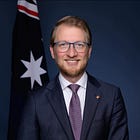Government Faces Pressure from All Sides as Cabinet Meets on 2035 Climate Target
Today’s Article is brought to you by Empower your podcasting vision with a suite of creative solutions at your fingertips.
This piece is freely available to read. Become a paid subscriber today and help keep Mencari News financially afloat so that we can continue to pay our writers for their insight and expertise.
Federal Cabinet met this morning to finalize Australia's 2035 emissions reduction target, with political parties sharply divided over the expected announcement amid mounting pressure over power bill impacts and Pacific diplomatic failures.
Deputy Nationals Leader Kevin Hogan expressed skepticism about any ambitious target, warning of soaring electricity costs, while Greens Senator Sarah Hanson-Young criticized the Labor government for potentially announcing an unambitious target that would damage relationships with Pacific neighbors.
Speaking on Sky News First Edition, both politicians agreed the government has failed to adequately regulate big tech companies but diverged sharply on climate policy as Cabinet prepared to consider recommendations from the Climate Change Authority.
The Climate Change Authority, headed by Matt Keane, reportedly recommended a target between 65% and 75% emissions reduction by 2035, with the government expected to choose the lower end of that range.
Truth matters. Quality journalism costs.
Your subscription to Mencari directly funds the investigative reporting our democracy needs. For less than a coffee per week, you enable our journalists to uncover stories that powerful interests would rather keep hidden. There is no corporate influence involved. No compromises. Just honest journalism when we need it most.
Not ready to be paid subscribe, but appreciate the newsletter ? Grab us a beer or snag the exclusive ad spot at the top of next week's newsletter.
Nationals Demand Economic Analysis
Hogan said he would not support any target without comprehensive analysis of economic impacts, particularly on household power bills and Australian industry competitiveness.
"What I won't be happy with, and we'll see what they announce, but what I want to see as well is what this does to power bills," Hogan said. "We can have emission reduction ambitions, and I think that's important. However, what we're not seeing enough analysis on, and what I'm equally concerned about, is what this is going to mean for the power bills of Australian households."
The Deputy Nationals Leader cited reports suggesting the new target could cost $50 billion, demanding greater transparency about economic consequences.
"We have had power bills go through the roof over the last three to four years. We need to work as hard at that as we do at climate emission targets," he said.
Hogan expressed doubt about the government's ability to meet existing commitments before setting more ambitious goals.
"I have a lot of skepticism about what the government's going to announce today. They're not going to meet their 2030 targets," he said. "There's reports like this is going to be a $50 billion bill. We need more analysis done on that as well, which we're not seeing."
Greens Push for Ambitious Action
Hanson-Young argued any target in the 60% range would be insufficient and damage Australia's international reputation, particularly with Pacific island nations facing immediate climate threats.
"I hope the Prime Minister stands up and announces an ambitious target for 2035, something that is in line with the science and a plan to get us off fossil fuels," she said.
The Greens senator criticized Labor for failing to meet expectations of Pacific neighbors who want stronger Australian action on climate change.
"Nothing in the 60s is considered by anybody to be ambitious," Hansen-Young said. "We do need an ambitious target and we do need a plan to get out of fossil fuels, particularly fossil fuel exports."
She linked climate action to recent diplomatic setbacks in Papua New Guinea and Vanuatu, arguing stronger emissions commitments could improve Pacific relationships.
"Our Pacific family are actually asking us to step up and do more because the climate threat is already impacting these communities and those nations," Hanson-Young said. "Rather than just strong-arming them over China, we should be... The Prime Minister should have been able to go to the Pacific today, this week, with a genuine and ambitious plan to help the climate crisis."
Bipartisan Concerns Over Tech Regulation
Both politicians agreed the government has inadequately regulated major technology companies, though they focused on different aspects of the problem.
Hanson-Young expressed concern about the government's broader approach to big tech regulation, including the upcoming social media ban for users under 16.
"I'm concerned that the government's going soft on big tech across the board," she said. "The social media ban for 16-year-olds and under will come into place in December 10, and I think it's going to be a huge flop."
She warned parents would find children easily circumventing restrictions while platforms remain unsafe.
"These platforms are not being forced to be safer," Hanson-Young said. "All the sounds out of the government at the moment on AI, letting the big tech companies run AI policy in this country are alarming too."
Hogan agreed on technology concerns, particularly regarding Chinese ownership of TikTok following U.S. moves to force divestment.
"If we have security concerns, if we have concerns about a platform, the ownership of it, the control of it, obviously we should look at it," he said. "Information and technology is very important."
The Deputy Nationals Leader also raised concerns about the News Bargaining Code, saying tech companies extract content from news providers without adequate compensation.
"We have these big tech companies too going through and scraping information off news providers and at great cost to those news providers to provide that content," Hogan said.
Carbon Tariff Debate
When asked about implementing carbon tariffs to protect Australian businesses from international competitors with weaker climate policies, the politicians offered contrasting views.
Hansen-Young supported measures to address global warming but criticized comparisons to U.S. trade policy under President Donald Trump.
"Donald Trump doesn't even believe in climate change. He's taken the US backwards. He's taken them out of the Paris Agreement," she said. "Donald Trump's kind of attitude to climate change is similar to some of the attitude we're seeing come out of the coalition party room right now."
Hogan opposed carbon tariffs, arguing they would contradict Australian criticism of Trump's trade policies while threatening key export industries.
"We sell $650 billion worth of stuff overseas. We can hardly say that Trump's tariffs are bad and then say we're going to introduce our own tariffs. So that would be hypocritical," he said.
He emphasized the importance of regional export industries to the national economy.
"Our export industries, all from regional Australia, coal, iron ore, gas and food, is funding this nation and very important to us economically," Hogan said.
Political Pressure Mounting
The Cabinet meeting comes amid broader criticism of the Albanese government's competence across multiple policy areas, from Pacific diplomacy to energy costs and technology regulation.
Today's climate announcement will test whether the government can balance competing pressures from environmental advocates seeking ambitious action and industry groups warning about economic impacts.
The debate reflects deeper political divisions over Australia's climate response as the country grapples with international expectations, Pacific relationships and domestic economic concerns.
Both opposition parties signaled they will scrutinize whatever target emerges from Cabinet, with the Nationals focusing on cost impacts and the Greens demanding greater ambition aligned with climate science.
The government faces the challenge of announcing a target that satisfies international commitments while addressing domestic concerns about energy costs and industrial competitiveness in an increasingly competitive global economy.
Sustaining Mencari Requires Your Support
Independent journalism costs money. Help us continue delivering in-depth investigations and unfiltered commentary on the world's real stories. Your financial contribution enables thorough investigative work and thoughtful analysis, all supported by a dedicated community committed to accuracy and transparency.
Subscribe today to unlock our full archive of investigative reporting and fearless analysis. Subscribing to independent media outlets represents more than just information consumption—it embodies a commitment to factual reporting.
As well as knowing you’re keeping Mencari (Australia) alive, you’ll also get:
Get breaking news AS IT HAPPENS - Gain instant access to our real-time coverage and analysis when major stories break, keeping you ahead of the curve
Unlock our COMPLETE content library - Enjoy unlimited access to every newsletter, podcast episode, and exclusive archive—all seamlessly available in your favorite podcast apps.
Join the conversation that matters - Be part of our vibrant community with full commenting privileges on all content, directly supporting The Evening Post (Australia)
Catch up on some of Mencari’s recent stories:
It only takes a minute to help us investigate fearlessly and expose lies and wrongdoing to hold power accountable. Thanks!








